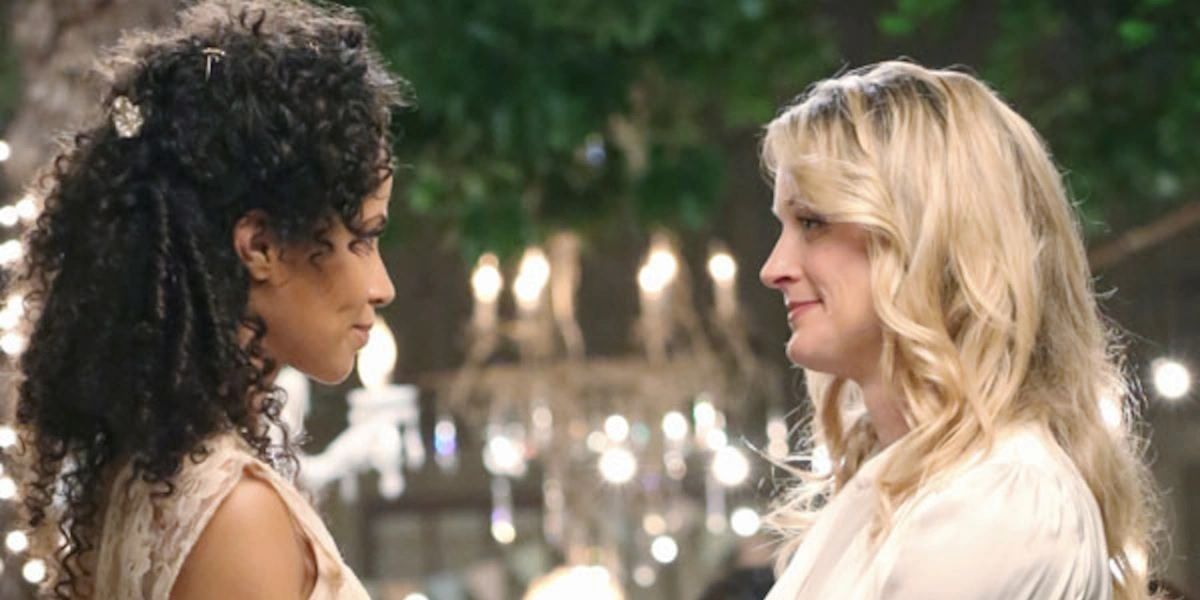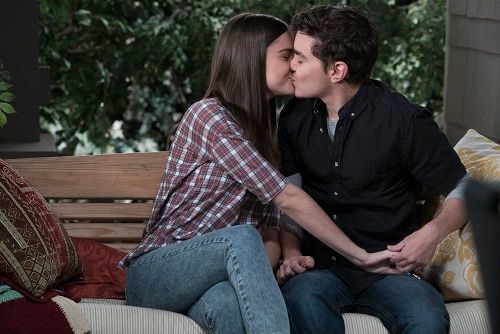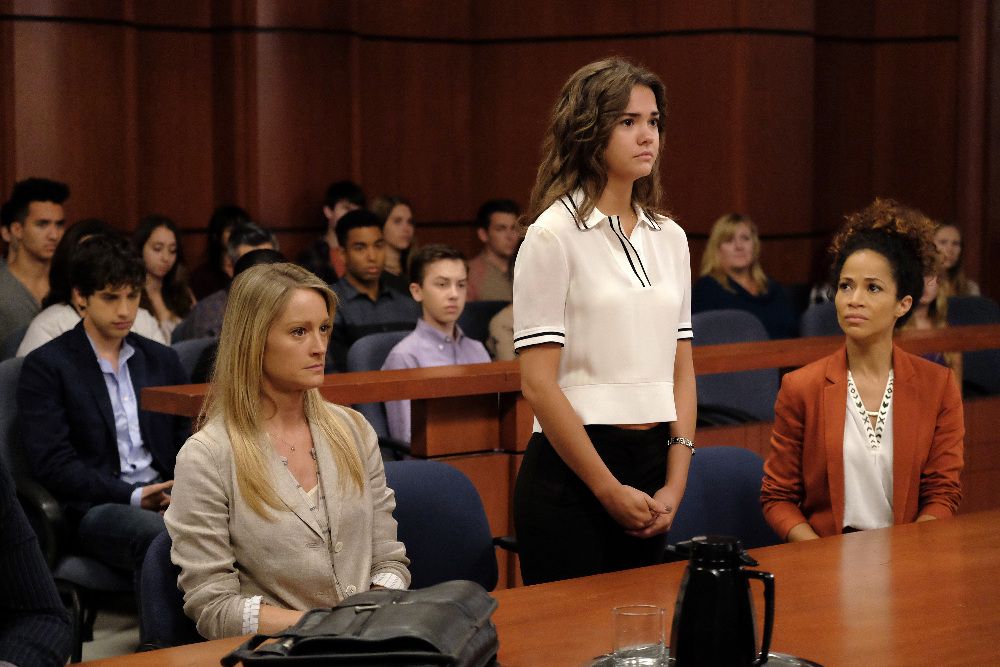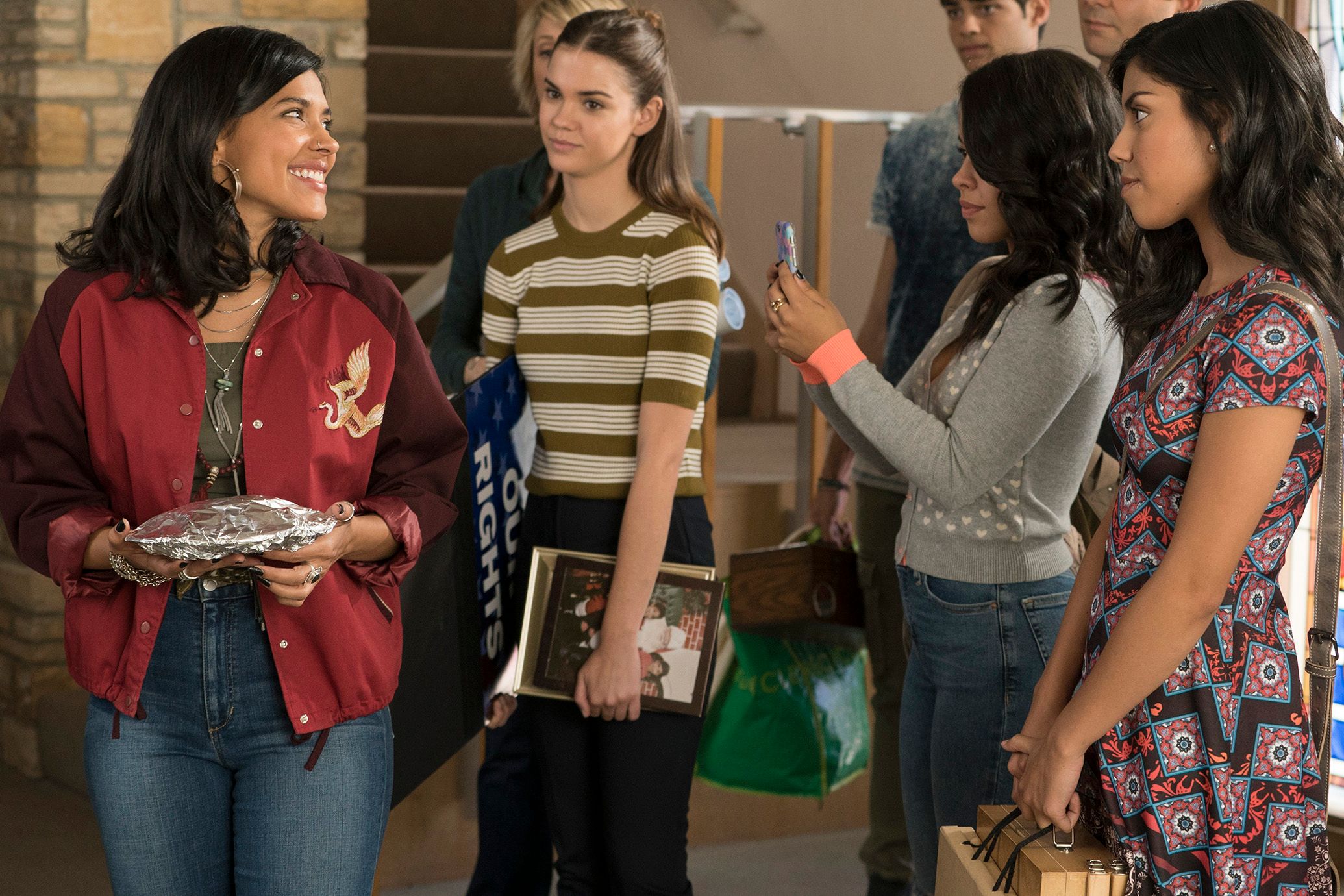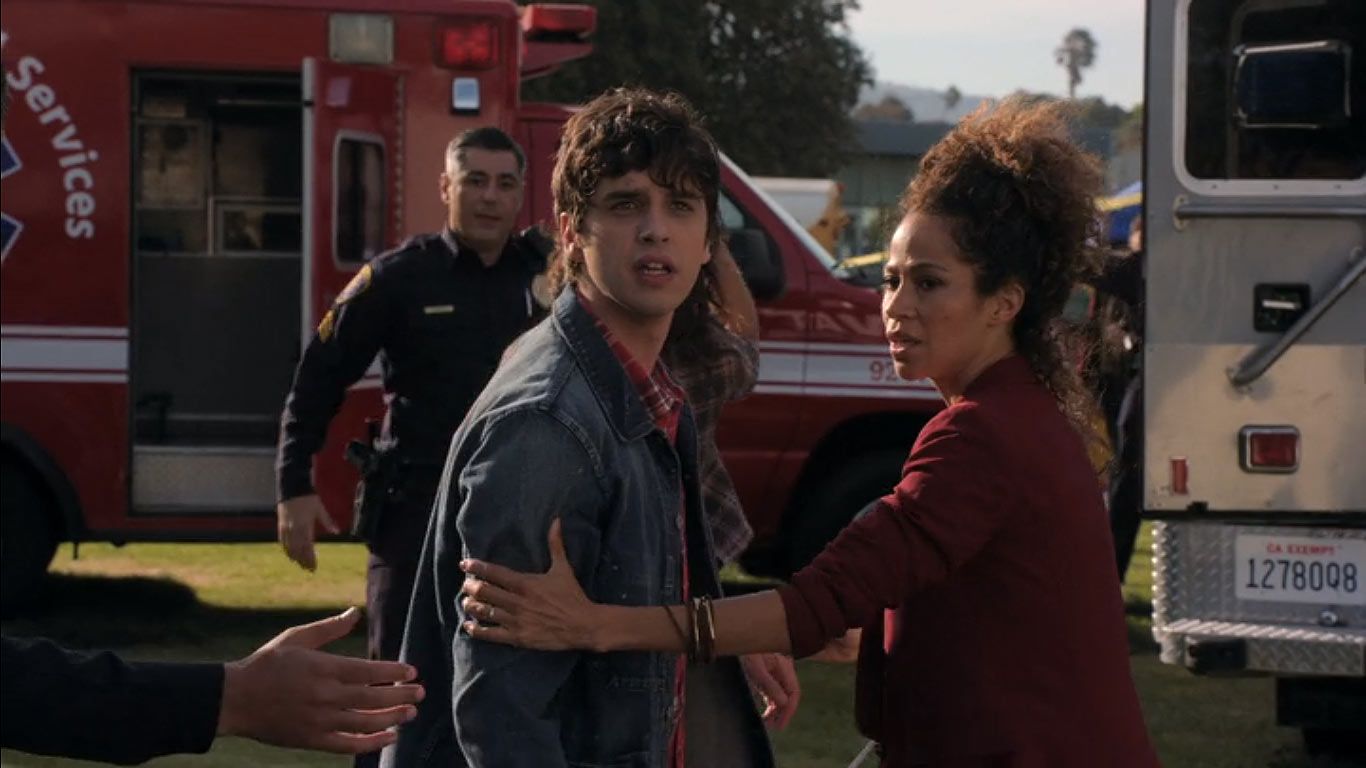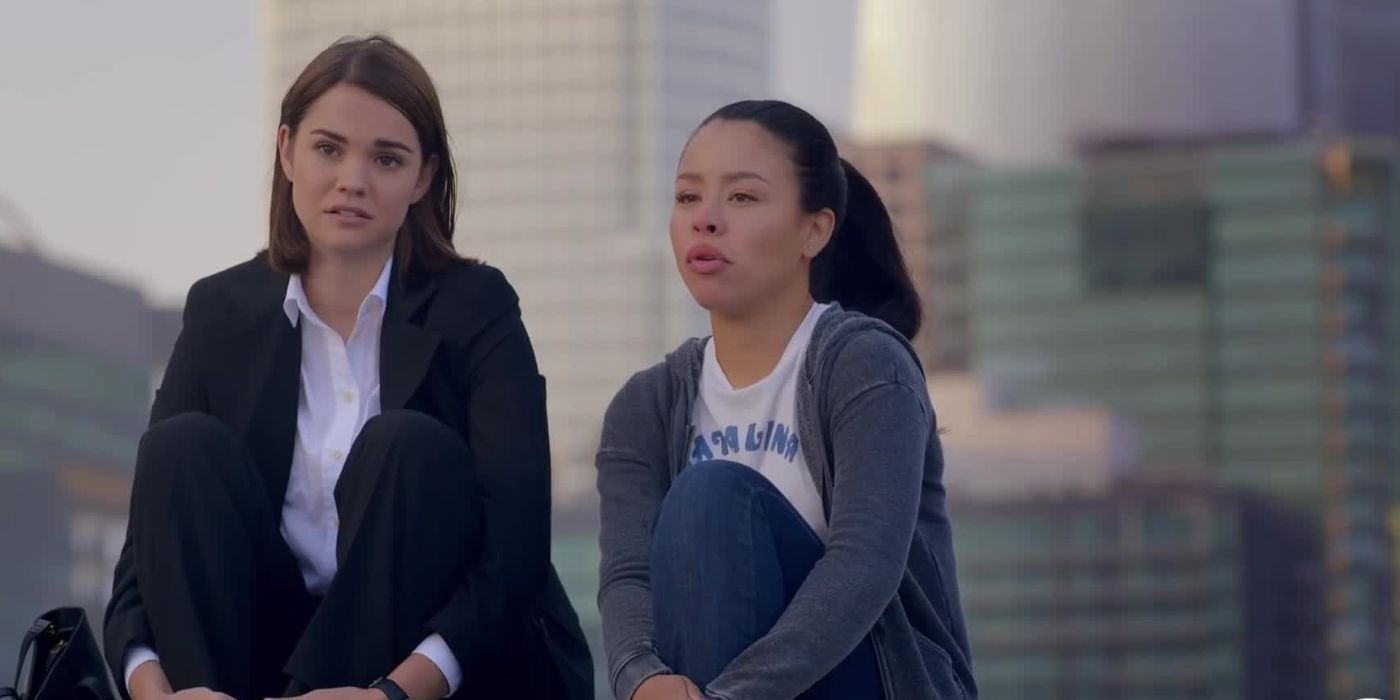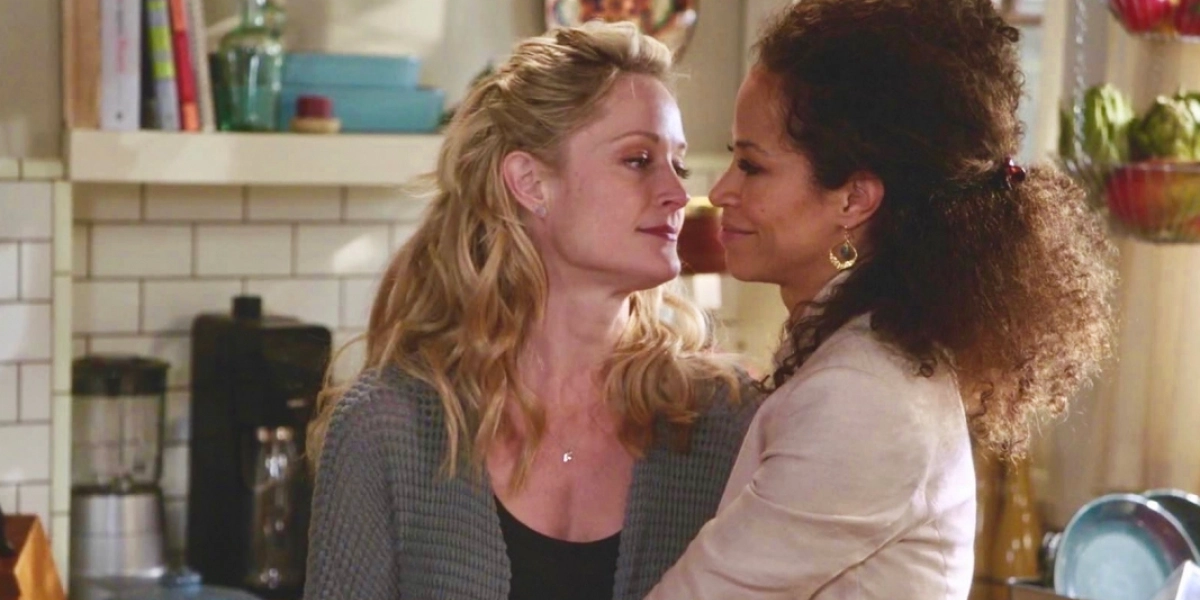The Fosters was an important, revolutionary show when it premiered back in 2013 and continues to be a timely — and arguably even more crucial — piece of media 10 years later. Throughout its five seasons, the Freeform (known as ABC Family at the time) series centered around a San Diego family consisting of Stef (Teri Polo), a police officer, and her vice principal wife, Lena (Sherri Saum), along with their five kids: Brandon (David Lambert), a piano prodigy and Stef’s biological son from a previous marriage; adopted twins Mariana academically gifted, fashion-forward (played by Cierra Ramirez) and Jesus, athletic, often the comic relief (played by Jake T. Austin in earlier seasons, Noah Centineo in later ones); and rebellious foster children Callie (Maia Mitchell) and her sweet younger brother, Jude (Hayden Byerly). It had all the trademarks of the classic teen dramas that came before it: steamy love triangles, high-stakes school dances, and out-of-control house parties among them. But before the show even premiered, it was clear that it was so much more.
Months before the first episode dropped, the series drew the criticism of a conservative organization known as One Million Moms, which often fights against same-sex couples in the media. Despite this, the show pushed on, even picking up a GLAAD award for Outstanding Drama Series in 2014. Both the backlash and the accolades cemented The Fosters’ place as a groundbreaking piece of LGBTQ+ media a decade ago. And 10 years after it first aired, with an unprecedented number of anti-LGBTQ+ laws being presented and passed — not to mention the other issues it addressed like school shootings and police brutality continuing to make heartbreaking headlines — it’s clear that The Fosters is more relevant than ever.
‘The Fosters’ Handles LGBTQ+ Issues With Authenticity and Heart
The Fosters racked up a bevy of superlatives and set a number of records regarding representation, particularly in terms of its LGBTQ+ plotlines and characters. The mid-Season 1 finale saw Stef and Lena getting married, which would be the first gay wedding on television after the Defense of Marriage Act was struck down by the Supreme Court. A Season 2 episode saw 13-year-old Jude kiss Connor (Gavin MacIntosh) after their relationship had slowly blossomed from a friendship into something more — the youngest same-sex kiss on U.S. television at the time.
But the refreshing thing about The Fosters is it doesn’t feel like these things are written simply to make headlines or create buzz. It’s never afraid to invite controversy, but it never goes out of its way to create it either. In fact, the show’s most radical act may be its normalizing of these topics, presenting them as something not controversial at all. The drama stems not from the hot-button issues but from the characters and their journeys — characters the show honors and journeys that are told with the care and nuance they deserve.
The Fosters depicts its characters not as instruments for getting a message out but rather as multi-dimensional, fully-formed individuals — ones who are allowed to want, feel, and be flawed. Stef and Lena’s wedding is beautiful, but their marriage is full of ups and downs. Jude and Connor’s kiss is long-awaited and satisfying, but they still have to deal with the confusion and pitfalls of young love. In a time when people are still burying their gays, it’s life-changing to get to see characters going about their lives, both dealing with relatable problems and also experiencing joy and hope.
This is especially true when it comes to the show’s trans characters. Transgender representation is still rare, with transmasculine characters even rarer. For The Fosters to have two prominent trans men — both played by trans actors — is almost unheard of. There’s Cole (Tom Phelan), who Callie meets at a group home. Although the two of them get off to a rocky start, they eventually find common ground and become good friends. And despite Cole’s tragic past, which includes being kicked out of his home due to his parents not being accepting of his identity and frequently being bullied and misgendered, in later seasons, we see that Cole has managed to overcome these obstacles by getting gender-affirming surgery and using his experience to help other LGBTQ+ youth. Cole is living proof that there is light after the darkness and that advocacy can be a great way to give back and heal.
In addition to Cole, there’s also Aaron (Elliot Fletcher). Aaron struggles with similar rejection from his parents, but in later seasons, his mother comes around and begins to accept him more. It’s not immediately or easily fixed, but this is another example of The Fosters not shying away from the complexities of hard topics like parental relationships and forgiveness — especially surrounding the subject of transition. Aaron is also unique in that he becomes a serious love interest for Callie, with the fact of his being trans not seen as a negative element nor a fetishized one. Instead, he’s treated like any other of Callie’s boyfriends. Seeing a trans man be an object of desire, especially for a main character, and the way it’s handled is affirming. The fact Aaron has dreams and a personality outside of being Callie’s boyfriend gives him real agency as well, leading him to be someone that young trans people can see themselves in.
‘The Fosters’ Isn’t Afraid to Get Real About Social Justice
The Fosters is known for its queer representation, but the show tackles so many more issues in that same authentic, sensitive way. As its clever name suggests, the series explores the failures of the foster care system. Though Stef and Lena are loving parents, Callie and Jude have had horrifying experiences at other foster homes, with abusive and neglectful caretakers. In fact, when we first meet Callie, she’s getting out of juvie for protecting her brother. Unfortunately, many foster children find themselves in the system — oftentimes unfairly. There are certain complications that can arise after adoption, too. Mariana, for example, wants to find her biological mother, Ana (Alexandra Barreto), who she hasn’t seen since she was young. Though the two do eventually form a decent relationship over the course of the show’s five seasons, it’s a rocky road, as Ana first uses Mariana to try and get money for drugs.
Race also comes into play. Lena is biracial, with a Black mother and white father, and she can struggle with her identity and feeling of belonging. Stef and Lena take in another foster child named AJ (Tom Williamson) in Season 3, and a misunderstanding causes him to be racially profiled while out with Stef’s ex-husband Mike (Danny Nucci). The show discusses the horror of police brutality and racism, especially when it comes to the Black community. With stories of Black people being harassed and killed by law enforcement in the news every day, the show, unfortunately, holds up a mirror to real life.
The subject of immigration is prominent, too. In the first season, Mariana’s friend and Jesus’ girlfriend Lexi (Bianca A. Santos) discovers she is undocumented, leading to conflict with her parents for not telling her and stress that they may have to move back to Honduras. In later seasons, this topic is explored more deeply with Callie’s friend Ximena (Lisseth Chavez) and her younger sister Poppy (Nandy Martin), whose parents migrated to the U.S. from Mexico under the Dream Act. Ximena has to take on a massive amount of responsibility, as she would become Poppy’s legal guardian if her parents were to be deported despite being only a teenager herself. Through Ximena’s arc, the show brings the cruelty of ICE and information about the DACA program to light.
One of the most heartbreaking stories is Callie coping with sexual assault from a foster brother. The story is introduced in Season 1, and the show does a great job of showing an honest depiction of healing and how the trauma impacts her and her relationships. There’s guilt, with Callie doubting herself and her reaction to it, as well as a fear and hesitancy to be intimate with new romantic partners due to having flashbacks of the assault. Nearly a quarter of women have been assaulted in their lifetime, and though things like the #MeToo and Time’s Up movements are working to bring awareness to this and end the stigma, society still clearly has a long way to go.
Another harrowing storyline The Fosters explores is that of a school shooting. The Season 4 premiere sees Anchor Beach going into lockdown, with the rest of the season showing how this traumatic event manifests itself in anxiety and nightmares, bringing mental health and PTSD into the fold. With the United States averaging approximately two mass shootings a day and gun violence a more pressing topic than ever after the tragedies of Uvalde last May and Michigan University earlier this year, it’s a subject that every young person who’s ever had to go through a lockdown drill will sadly relate to.
‘The Fosters’ Continues Its Legacy with Spin-Off ‘Good Trouble’
Though The Fosters came to an end in 2018, a spin-off of the show focusing on daughters Callie and Mariana starting their professional lives and living in a communal living building called The Coterie in Los Angeles premiered the same year. The new series, Good Trouble, continues The Fosters’ legacy of tackling important issues of the time. For example, it carries on the Black Lives Matter conversation, particularly with Callie and Mariana’s friend Malika (Zuri Adele), an activist. The show even enlisted Patrissa Cullors, the international director of BLM, to consult and ultimately write on the show to ensure the storyline was handled with care and authenticity. Callie’s career as a lawyer also adds an interesting shade to the conversation, as her job’s ethics and personal moral compass don’t always align, leading her to make hard choices. Mariana’s job is a conversation starter as well. A brilliant coder, Mariana often has to deal with sexism in the workplace due to being one of the only women in a male-dominated field.
In addition to Malika, Good Trouble’s new crop of characters cohabitating at The Coterie bring their own perspectives and challenges to the table. The building manager, Alice (Sherry Cola), is a first-generation Asian-American lesbian pursuing comedy. Her sexuality and dreams can often cause tension with her traditional family, and her AAPI heritage can lead to her getting harassed — another sad case of art imitating life. Davia’s (Emma Hunton) roles as both a teacher and body-positive influencer have led to interesting conversations. As a teacher, Davia struggles to figure out what to do when she discovers one of her students is unhoused — a taboo that’s not often covered on television despite over half a million people experiencing it in the U.S. Her relationship with her mother is also strained due to Davia being plus-sized, with the subject of fatphobia being explored.
‘The Fosters’ Is More Important A Decade After Its Premiere
A decade after it first premiered, The Fosters is more important than ever. Art is an important way to showcase the world, and The Fosters’ commitment to including strong, complex characters of all genders, sexualities, races, and more can not only make people in those groups feel represented and less alone but also expand the worldview of others who may not know someone who belongs to them in real life. It can also be a tool to fight back against oppression and an instrument to inspire change. With the state of the world being what it is today — with rampant anti-LGBTQ+ legislation, a rise in race-based hate crimes, record numbers of gun violence, and more — The Fosters and its sensitive, fearless storytelling is more important than ever.
Stay connected with us on social media platform for instant update click here to join our Twitter, & Facebook
We are now on Telegram. Click here to join our channel (@TechiUpdate) and stay updated with the latest Technology headlines.
For all the latest TV News Click Here

